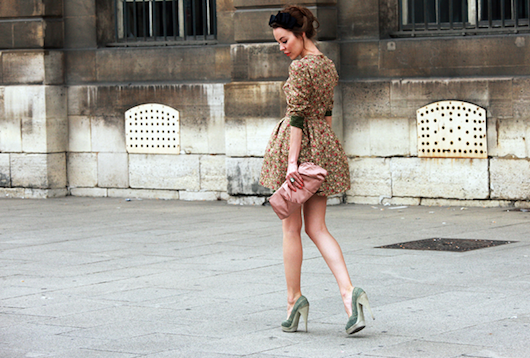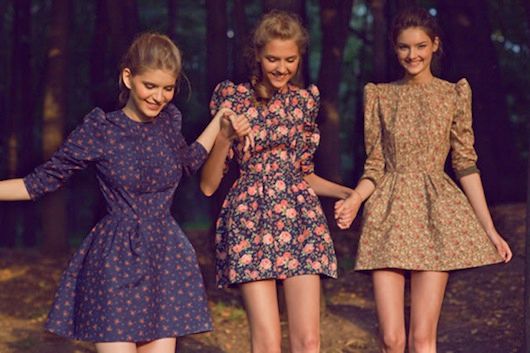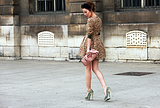

After a plethora of direct comments, overheard remarks, and the occasional "well you should expect it with that strange hair" lines, I felt inspired to write this post around the idea that: attention receiving is not the same as attention seeking. In fact, this could also be rephrased as "attractive to you doesn't mean attempting to attract you;" a sentence I certainly wish street harassers would memorize and take to heart. In the States we often like to believe we're free thinking and open-minded, a society of rebels from the Boston Tea Party to James Dean; all of us on motorcycles with leather jackets and without a cause. Similarly, nearly every Hollywood movie I've seen featuring snippets of Japan are quick to throw in the Japanese adage of "the nail that sticks out gets hammered down." But how are we really so different from our idea of this country we use as an example of conformity when nearly every magazine or fashion show we create criticizes anyone who might buck the norm with "worst dressed columns" and detailed articles on what's trendy and how to wear it. I mean, it really is not enough to be told the trend is neon, we are also given guidance on how neon is properly worn--don't look like someone from the 80s, take these tips and inject a little neon into your wardrobe while still appearing societally acceptable. Yet, we aren't a country of conformity, right...?
My point isn't to criticize how-to guides on style or even devolving this discussion into my own annoyance with random comments. People enjoy tips on how to wear more difficult trends; they given them practical ideas and help them figure out wear to shop. The point rather is that this idea of "proper attire" means that those who don't follow the rules stand out. Perhaps they don't follow the trends at all; they're the only one in their small town that choose daily to don vintage dresses or the only girl at their high school who discovered punk rock and convinced their parents to let them dye her hair or shave her head, or it can even be the tomboy in a group of more outwardly feminine friends who keep trying to force makeup on her. They stand out. However, they probably aren't standing out for the purpose of receiving attention. For one thing let's acknowledge that we can't know someone's motivations merely from seeing them on the street; not their reasons for putting on those clothes that morning nor anything else.
As a shy person myself I can attest that I didn't dye my hair blue to receive more random attention on the street. I knew that in making this decision I would be labeled as the "one with blue hair" whenever described to strangers by my friends, although I didn't know strangers would suddenly have a desire to touch my hair to ascertain if it was a "real" or not...Yet, a response I often receive to my hair is "well, you must like attention." Which isn't the case. I stare at my feet when walking through crowded spaces, turn positively red when I feel as if a lot of people are staring at me, and have even on occasion become tongue-tied when approached. However, blue hair was something I always wanted since I was little, so I decided to ignore my more self-conscious tendencies and just dye it.
I only use my personal experience as an example to illustrate the broader point I stated earlier: attention receiving is not the same as attention seeking. Certainly there are attention-seeking fashion choices or outfits chosen for shock-value--any street fashion photography site will eventually confirm that. However, often the people we see walking around who appear outside of the cultural norm for the region aren't dressing with the intent of turning heads or being photographed. I'd happily live in a city filled with blue-haired girls in white dresses; that would be quite fun and would probably alleviate some of my shyness when leaving my house. I am of course quite capable of leaving my house alone and fielding comments from strangers on my hair (despite how red my cheeks might get), but what is perhaps the most frustrating is the assumption that my decision (or another's) was based on a desire for attention. Let's stop assuming we understand people's motivations after a brief visual assessment and reducing someone's decisions to anything so simplistic as a desire to be stared at...
*photographs of Ulyana Sergeenko who has turned her eye-catching street style into a couture line
My point isn't to criticize how-to guides on style or even devolving this discussion into my own annoyance with random comments. People enjoy tips on how to wear more difficult trends; they given them practical ideas and help them figure out wear to shop. The point rather is that this idea of "proper attire" means that those who don't follow the rules stand out. Perhaps they don't follow the trends at all; they're the only one in their small town that choose daily to don vintage dresses or the only girl at their high school who discovered punk rock and convinced their parents to let them dye her hair or shave her head, or it can even be the tomboy in a group of more outwardly feminine friends who keep trying to force makeup on her. They stand out. However, they probably aren't standing out for the purpose of receiving attention. For one thing let's acknowledge that we can't know someone's motivations merely from seeing them on the street; not their reasons for putting on those clothes that morning nor anything else.
As a shy person myself I can attest that I didn't dye my hair blue to receive more random attention on the street. I knew that in making this decision I would be labeled as the "one with blue hair" whenever described to strangers by my friends, although I didn't know strangers would suddenly have a desire to touch my hair to ascertain if it was a "real" or not...Yet, a response I often receive to my hair is "well, you must like attention." Which isn't the case. I stare at my feet when walking through crowded spaces, turn positively red when I feel as if a lot of people are staring at me, and have even on occasion become tongue-tied when approached. However, blue hair was something I always wanted since I was little, so I decided to ignore my more self-conscious tendencies and just dye it.
I only use my personal experience as an example to illustrate the broader point I stated earlier: attention receiving is not the same as attention seeking. Certainly there are attention-seeking fashion choices or outfits chosen for shock-value--any street fashion photography site will eventually confirm that. However, often the people we see walking around who appear outside of the cultural norm for the region aren't dressing with the intent of turning heads or being photographed. I'd happily live in a city filled with blue-haired girls in white dresses; that would be quite fun and would probably alleviate some of my shyness when leaving my house. I am of course quite capable of leaving my house alone and fielding comments from strangers on my hair (despite how red my cheeks might get), but what is perhaps the most frustrating is the assumption that my decision (or another's) was based on a desire for attention. Let's stop assuming we understand people's motivations after a brief visual assessment and reducing someone's decisions to anything so simplistic as a desire to be stared at...
*photographs of Ulyana Sergeenko who has turned her eye-catching street style into a couture line









No comments:
Post a Comment